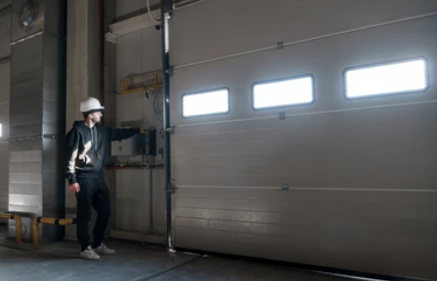


How Industrial Door Components Impact Workplace Efficiency
In industrial settings, efficiency is paramount. Every aspect of the facility, including the doors, plays a crucial role in streamlining operations and maximizing productivity. Industrial door components are not just functional elements but can significantly impact workplace efficiency in several ways.
Speed and Cycle Time
The speed at which industrial doors open and close directly affects the flow of traffic, materials, and personnel. Slow-moving doors can create bottlenecks, leading to delays and reduced productivity. Choosing high-speed door components, such as high-cycle springs, powerful motors, and efficient track systems, can minimize cycle times and ensure smooth, rapid operations.
Insulation and Temperature Control
Many industrial processes require strict temperature control to maintain product quality, worker comfort, and energy efficiency. Inadequate insulation can lead to heat loss or gain, disrupting temperature-sensitive operations and increasing energy costs. Investing in well-insulated door panels, weather seals, and advanced insulation materials can help maintain optimal thermal conditions, thereby enhancing workplace efficiency and reducing energy expenditures.
Safety and Accident Prevention
Workplace accidents can lead to costly downtime, injuries, and potential legal liabilities. Industrial door components with robust safety features, such as safety edges, photo-eye sensors, and audible/visual alarms, can significantly reduce the risk of accidents. By prioritizing safety, businesses can minimize disruptions, maintain a productive workforce, and avoid costly legal consequences.
Access Control and Security
Unauthorized access to restricted areas can compromise workplace safety, intellectual property, and operational integrity. Access control systems integrated with industrial doors, such as card readers or biometric scanners, can enhance security and ensure that only authorized personnel can enter sensitive areas. This added layer of security not only protects valuable assets but also minimizes distractions and potential breaches, allowing employees to focus on their tasks.
Durability and Maintenance
Industrial doors are exposed to heavy use, harsh environments, and potential impacts. Door components that are not designed for industrial applications may require frequent repairs or replacements, leading to costly downtime and decreased efficiency. Investing in durable, low-maintenance door components can minimize unplanned stoppages, reduce maintenance costs, and extend the lifespan of the door system.
Automation and Integration
Modern industrial door components often feature advanced automation capabilities and seamless integration with other building systems. Automated doors can reduce the need for manual intervention, freeing up personnel for other tasks. Additionally, integration with building management systems, production lines, or material handling equipment can streamline operations, enhance coordination, and optimize overall workplace efficiency.
By carefully selecting and integrating the right industrial door components, businesses can unlock significant efficiency gains. From reducing cycle times and maintaining optimal environmental conditions to enhancing safety, security, and automation, these components play a pivotal role in creating a productive and efficient workplace.
Partnering with experienced industrial door manufacturers and consultants can help businesses identify the most suitable components for their specific operations, ensuring optimal efficiency, productivity, and long-term cost savings.